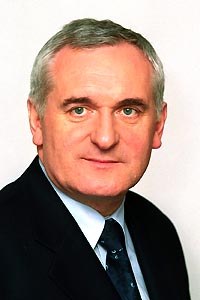|
This is an archived article.
For the latest news, go to the Advance Homepage
For more archives, go to the Advance Archive/Search Page. |
||||
|
Dodd Prize To Be Awarded The inaugural Thomas J. Dodd Prize in International Justice and Human Rights will be awarded on Sept. 24 to the prime ministers of the United Kingdom and Ireland. [The ceremony will be held at 11 a.m. in the Dodd Center Plaza.] Prime Minister Tony Blair and Taoiseach (Prime Minister) Bertie Ahern are being honored for developing the Good Friday Agreement, a blueprint for peace and justice following decades of conflict in Northern Ireland. Ahern will attend; John Prescott, deputy prime minister and first secretary of state, will accept the prize on Blair's behalf.
The Dodd Prize is named for Sen. Christopher J. Dodd's late father, Thomas, who was a senator from Connecticut from 1959 to 1971 and was executive trial counsel at the Nuremberg Trials. Both Dodds have fought on behalf of human rights in the United States and abroad. "We are honored to be associated with Sen. Dodd and his family in this enterprise," said UConn President Philip E. Austin. "The Dodd Center, and the University as a whole, has made research and teaching in the field of human rights a key area of emphasis. In commemorating the historic contributions to peace in Northern Ireland made by Prime Ministers Blair and Ahern, the Thomas J. Dodd Prize in International Justice and Human Rights sets a standard we hope to see others follow in the years to come." "Whether human rights mean the right of a young child to walk safely to school or the right of an entire nation to determine its own future, there are few who have done more in recent history to advance the cause of human rights than Tony Blair and Bertie Ahern," said Dodd (D-Conn.). "Together, they devoted their time, their energy, and their hearts to bringing peace to a part of the world that has been ravaged by conflict. The Good Friday Agreement simply would not have happened were it not for the steadfast dedication and deep personal commitment of these two outstanding individuals." The Thomas J. Dodd Research Center was dedicated in 1995 by President Bill Clinton, who launched a year of human rights activities and programming on the UConn campuses. The $75,000 prize is to be given biennially "to an individual or group who has made a significant effort to advance the cause of international justice and global human rights." This year, it will be awarded at 11 a.m. during a ceremony on the plaza of the Thomas J. Dodd Research Center. In case of rain, the ceremony will take place in the Rome Ballroom in South Campus. Blair and Ahern were selected for the prize by the advisory board of the Thomas J. Dodd Research Center. Ambassador Thomas J. Dodd Jr., son of Thomas J. Dodd and brother of Christopher Dodd, heads the board. "For my father, participating in the Nuremberg trials was a defining event in his life," Christopher Dodd said. "It reaffirmed his belief in the rule of law but, even more importantly, it opened his eyes to the incredible suffering that some human beings have had to endure - not only in the fires of the Holocaust, but in other oppressive regimes around the world. "There is no more fitting tribute to my father's memory than the Thomas J. Dodd Research Center and the Thomas J. Dodd Prize in International Justice and Human Rights," Dodd said. "Many years from now, people may not remember who Thomas Dodd was. But because of this center and this prize, they will know exactly what he stood for." The Good Friday agreement, reached in 1998, is designed to end conflict in Northern Ireland, which originated in deep divisions on political, constitutional, and religious issues. In 1998, Blair commented, "the irresistible force - the political will - has met the unmovable object - the legacy of the past - and we have moved it. The idea that if one side wins something in Northern Ireland the other loses, that's gone. The essence of what we have agreed is a choice: we are all winners or all losers." The political division of Ireland dates from the 1920s when, after centuries of British rule, 26 of the 32 counties of Ireland gained independence. The remaining six counties formed Northern Ireland, which continued to be governed as part of the United Kingdom. Efforts by the British and Irish governments to cooperate more fully began in the 1980s, and led to the Good Friday Agreement in 1998, which committed both governments to constitutional change in Northern Ireland and a framework for cooperation on the island of Ireland and also between Ireland and Britain. "The agreement provides for a new beginning - based on partnership, cooperation, and mutual respect - in relationships within Northern Ireland, between North and South, and between Ireland and Britain," said Ahern. "It does not mean an end to difference. It does not spell victory or defeat for either nationalism or unionism. But it does provide for a fair and honorable accommodation between nationalism and unionism, creating a level playing field in which both traditions can promote their legitimate political objectives. And it offers real opportunities for nationalists and unionists to work together to our mutual benefit, without being hindered by difference." Dodd noted that "by recognizing individuals who have done so much for human rights, we are not just celebrating the accomplishments of two people. We are also showing the world just how much can be achieved when people agree to set aside their differences and work together for the common goals of justice, peace, equality, and human dignity." Blair is the longest continuously sitting Labour Party prime minister in history. He became prime minister in 1997 after the Labour Party won the election by a landslide. He was re-elected in 2001 in another landslide. Born in Edinburgh, he studied law at Oxford. A Member of Parliament, he held a number of offices prior to becoming prime minister, including shadow secretary of state for energy, and shadow home secretary. Ahern became the prime minister of Ireland in 1997. He was elected to the Irish Parliament in 1977 and has served in a number of key posts, including labor minister, finance minister and head of his political party, Fianna Fail. Ahern was educated at University College, Dublin, and is an accountant by profession. Deputy Prime Minister John Prescott was born in Wales in 1938. He became Member of Parliament for the Hull East constituency in 1970. The Office of the Deputy Prime Minister is responsible for policy on housing, planning, devolution, regional and local government, and the fire service. Prescott also deputizes for the prime minister. |


